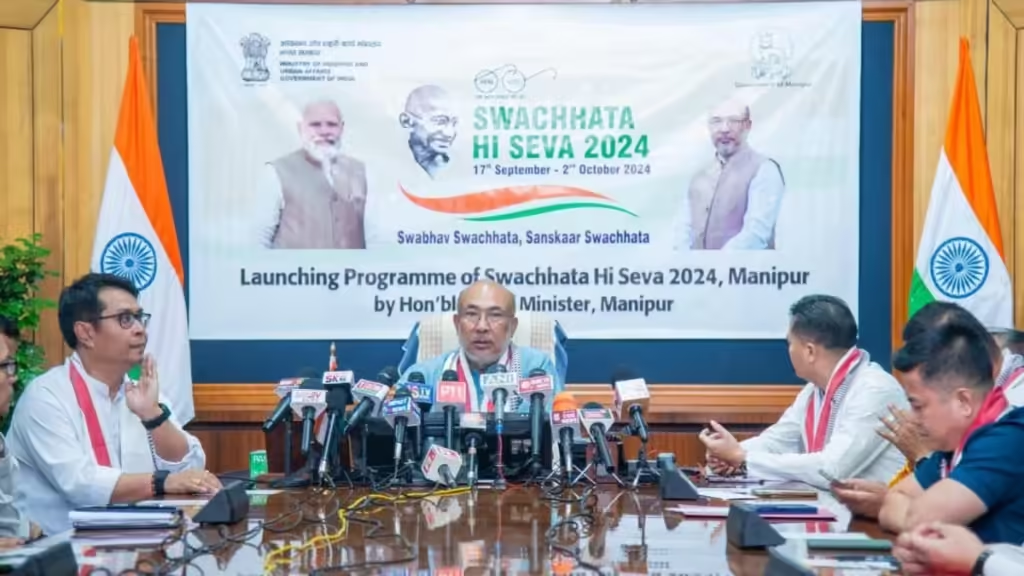Sikkim Chief Minister Prem Singh Tamang launched the “Swachhata Hi Seva” program with a strong focus on cleanliness and civic responsibility, calling on citizens to embrace a cleaner and greener Sikkim. The event, held in Gangtok on Monday, saw the CM highlighting the importance of public participation in keeping the state clean and ensuring sustainable development. Tamang emphasized that cleanliness is not just the government’s responsibility but a collective effort that requires cooperation from every citizen.
In his speech, the CM stressed the need for community-driven initiatives that go beyond government action. He noted that Sikkim, known for its natural beauty and environment-friendly practices, must set an example for the rest of the country in maintaining hygiene and sanitation. Tamang spoke passionately about the connection between cleanliness and tourism, pointing out how a clean environment attracts visitors and boosts the state’s economy.
The “Swachhata Hi Seva” program is designed to mobilize local communities, youth groups, and organizations to take proactive steps in cleaning public spaces and promoting waste management practices. Tamang called on educational institutions, non-governmental organizations, and local leaders to contribute to this effort by organizing cleanliness drives in their respective areas. He said that schools, in particular, play a crucial role in instilling a sense of responsibility toward cleanliness in young minds.
As part of the program, various awareness campaigns will be launched across Sikkim, focusing on reducing plastic use, proper waste segregation, and recycling. The Chief Minister also announced that the government would be providing additional support to municipalities to improve waste collection systems and ensure that proper sanitation measures are implemented in both urban and rural areas. He added that there will be incentives for communities that actively participate in the program and show tangible results in maintaining cleanliness.
Tamang took the opportunity to discuss another key issue—tax compliance. He mentioned that despite the significant support the government provides to its citizens in the form of development projects and welfare schemes, the state has not increased taxes for several years. He expressed concern over the fact that many people do not fully comply with tax regulations, putting undue pressure on the state’s finances. According to the Chief Minister, a clean and efficient state also requires a responsible citizenry that meets its tax obligations.
Tamang explained that while the state has managed to maintain financial stability without raising taxes, this approach may not be sustainable in the long run if tax compliance remains low. He encouraged residents to understand the connection between taxes and the services the government provides, including infrastructure development, healthcare, and education. By ensuring better tax compliance, he argued, the state would be able to continue funding critical projects without needing to impose additional financial burdens on its people.
In line with the “Swachhata Hi Seva” initiative, the Chief Minister also discussed plans to improve water and sanitation facilities in remote areas of Sikkim. He announced that the government is working on projects that aim to provide clean drinking water and proper sanitation to every household in the state. He underscored the importance of clean water and sanitation as fundamental human rights that the government is committed to ensuring for all its citizens.
Tamang’s address concluded with a call to action, urging all Sikkimese to take ownership of their environment. He encouraged people to view cleanliness not as a chore but as an integral part of their daily lives. He reminded the public that small, consistent efforts at maintaining cleanliness in their homes and neighborhoods could collectively lead to a significant positive impact on the state’s overall environment and public health.
The launch of the “Swachhata Hi Seva” program marks a significant step toward creating a cleaner and more responsible Sikkim. With an emphasis on public involvement and a broader sense of civic duty, the program aims to ensure that Sikkim remains a leader in environmental conservation and sustainable living, while also addressing issues like tax compliance and the equitable distribution of government resources.

